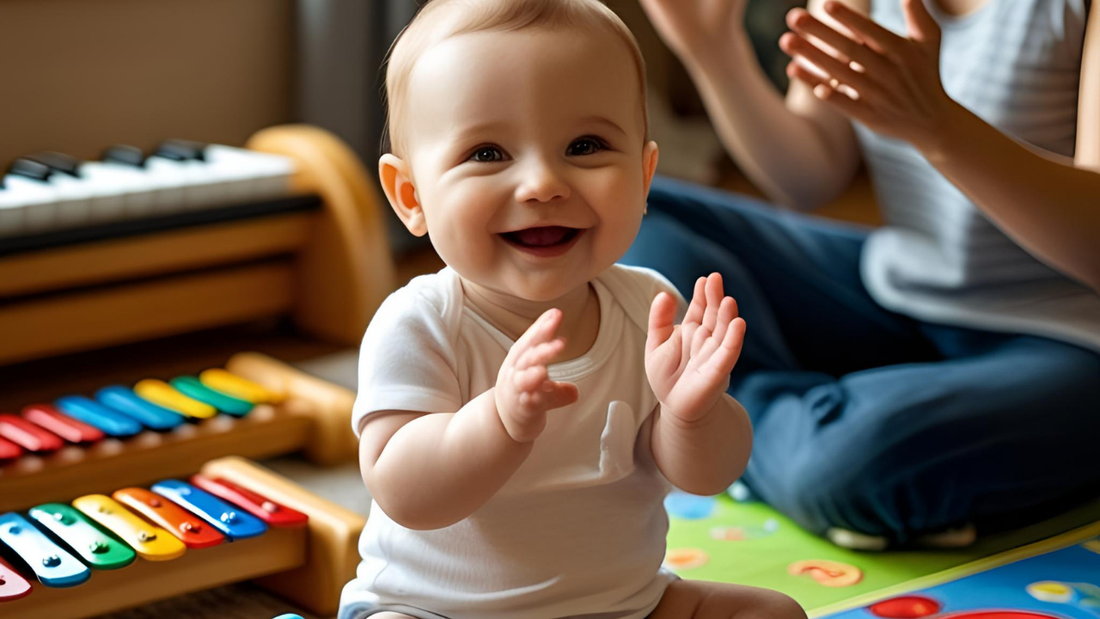
How Music Can Soothe, Stimulate, and Support Your Baby’s Growth
LiLLBUDFrom lullabies to rhythm games - music is your baby’s first language of learning.
Whether it’s a gentle hum at bedtime or a dance party in the living room, music for babies is more than just background noise. It’s a full-body, brain-building experience that fuels everything from emotional regulation to early language development.
Research shows that music not only entertains babies- it helps them learn, bond, and bloom. In fact, introducing rhythm and melody early on can positively impact your baby’s development in ways you might not expect.
Here’s how music works its gentle magic happen and how you can use baby songs, musical toys, and toddler music activities to make playtime into effective growth.
1. Soothing: Music That Calms and Connects
Ever wondered how a soft lullaby can cut off a baby’s mid-breath cries? That’s no coincidence. Soothing music for babies maintains a healthy heartbeat, breath, and even cortisol level (the stress hormone). It soothes overstimulated senses and induces feelings of security. Try:
-
Singing a consistent lullaby each night as a calming cue
-
Using soft background baby music during diaper changes or fussy times
-
Rocking to slow rhythms to help your baby fall asleep or calm down
Bonus: Your voice is your baby’s favorite instrument whether you’re pitch-perfect or not.
2. Stimulating: Music That Sparks Brain Development
Babies are born with billions of brain cells – what they need are experiences to wire them. And guess what? Baby songs with rhythm, repetition, and melody set off the brain like fireworks.
When your baby listens and moves, they’re building:
-
Auditory pathways (beneficial for speech and listening)
-
Memory (songs repeat patterns they begin to recognize)
-
Motor skills (as they bounce, clap, or wiggle)
Even a simple song such as “Twinkle Twinkle” or “The Wheels on the Bus” are full of rich learning moments.
Combining music with movement or sound-based musical toys for babies incorporates another level of sensory learning.
3. Supporting: Music and Baby Milestones
Music supports a wide range of baby development milestones—from those first coos to first dance steps. According to many baby milestone charts, children between 0–3 years progress through crucial stages where music can be a wonderful guide.
Here’s how music supports specific milestones:
|
Milestone |
Music-Based Activity |
|
Turning to sound (0–3 mo) |
Soft lullabies, parent’s singing voice |
|
Babbling (4–7 mo) |
Call-and-response songs, echo games |
|
Clapping & waving (8–12 mo) |
Action songs like “If You’re Happy…” |
|
First words (12–18 mo) |
Repetitive nursery rhymes with movement and gestures |
|
Dancing & jumping (18–36 mo) |
Upbeat toddler music activities |
Pro Tip: Print out a baby milestones chart and pair musical activities with each stage - it’s a playful method to support progress with purpose.
4. Easy Toddler Music Activities to Try Today
Music is one of the simplest (and most fun) tools in your parenting toolbox. Here are a few fun ways to use it at home:
DIY Shaker Instruments
Fill plastic containers with rice or lentils and have your toddler shake along to music.
Rhythm Clapping
Clap or tap out the rhythm of a song and have your toddler follow along – good for attention and coordination.
Sing Together (Even If Off-Key)
Whether it’s nursery rhymes, your favorite 90s song, or a made-up melody, singing fosters bonding and vocabulary building.
Freeze Dance
Play music, dance around, and "freeze" when the music stops. It’s a great way to develop self-control and listening skills.
Best Musical Toys for Babies That Boost Development
Not all toys are created equal, some are truly toys for brain development. Musical toys that react to your baby’s touch, shake, or press are great at learning cause-and-effect.
Top picks:
- Soft piano mats
- Baby-safe drums: Rainbow Drum
- Plush toys that can be explored in various ways: Hop and Pull Bunny, Tug and Hug Octopus
-
Wooden xylophones with soft tones
Go for toys that provide sensory diversity and promote interaction over passive listening.
Music Isn’t Extra – It’s Essential
Music isn’t just something nice to have in the background, it’s one of the most effective, natural ways to nourish your child’s emotional and cognitive growth.
Whether it’s a bedtime lullaby, a dance party after breakfast, or a simple toy with a jingle, every musical moment counts. You're not just keeping them entertained – you're shaping their minds.
So sing loud. Dance silly. And watch your baby’s world bloom, beat by beat.

